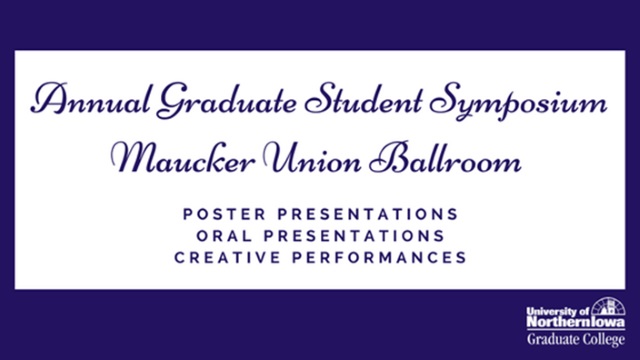
Complete Schedule
Award Winner

Recipient of the 11th Annual Graduate Student Symposium Scholarship Award, Oral Presentations, University Room - First Place (2018)
To go to the Graduate Student Symposium event page, Click here
Presentation Type
Open Access Oral Presentation
Keywords
Second language acquisition--Parent participation--Middle West; Sudanese American families--Middle West;
Abstract
In countries like the United States, where English is the dominant language, minority languages spoken in families and communities are at risk of being lost by the second and subsequent generations. This study thus examines the language maintenance and family language policies that exist in families of first-generation immigrant Sudanese residing in a Sudanese community in a Midwest university town of 74,000. The study aims to answer how family language policy, spoken or unspoken, affects the maintenance of the children's first language. The participants in this study were first generation immigrants, identified themselves as bilingual, resided in the United States for more than ten years and identified as parents of at least one child over the age of seven years old. The data were based on a written survey and a follow-up interview with the parents, eliciting information about their children's linguistic behavior. From the ten participants surveyed, half were interviewed. The participants selected to be interviewed consisted of parents whose children represented a range of fluency in Arabic, some being quite fluent, and other barely fluent, often in the same family. The findings indicate that the closer the parents felt their children were to their heritage cultural identity, the more likely these offspring were to maintain their Sudanese Arabic linguistic skills. The parents interviewed believed that involvement in and closeness to the heritage community on the part of the children played the most significant role in the child's heritage language maintenance and degree of cultural loyalty in their families.
Start Date
3-4-2018 1:00 PM
End Date
3-4-2018 4:00 PM
Year of Award
2018 Award
Faculty Advisor
Joyce Milambiling
Department
Department of Languages and Literatures
Copyright
©2018 Marwa Ibrahim
File Format
application/pdf
Embargo Date
4-6-2019
Language Policy in Sudanese-Arabic Speaking Families
In countries like the United States, where English is the dominant language, minority languages spoken in families and communities are at risk of being lost by the second and subsequent generations. This study thus examines the language maintenance and family language policies that exist in families of first-generation immigrant Sudanese residing in a Sudanese community in a Midwest university town of 74,000. The study aims to answer how family language policy, spoken or unspoken, affects the maintenance of the children's first language. The participants in this study were first generation immigrants, identified themselves as bilingual, resided in the United States for more than ten years and identified as parents of at least one child over the age of seven years old. The data were based on a written survey and a follow-up interview with the parents, eliciting information about their children's linguistic behavior. From the ten participants surveyed, half were interviewed. The participants selected to be interviewed consisted of parents whose children represented a range of fluency in Arabic, some being quite fluent, and other barely fluent, often in the same family. The findings indicate that the closer the parents felt their children were to their heritage cultural identity, the more likely these offspring were to maintain their Sudanese Arabic linguistic skills. The parents interviewed believed that involvement in and closeness to the heritage community on the part of the children played the most significant role in the child's heritage language maintenance and degree of cultural loyalty in their families.


